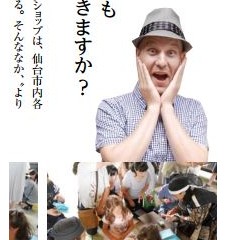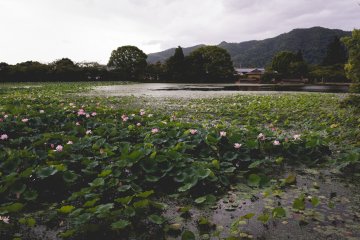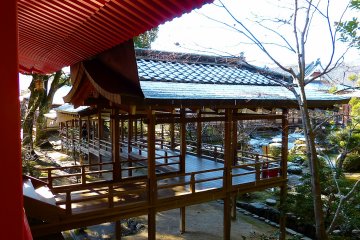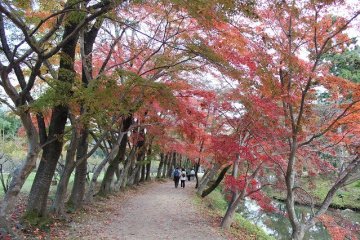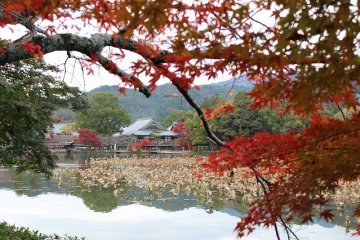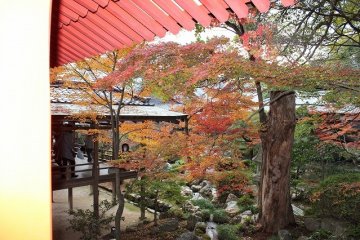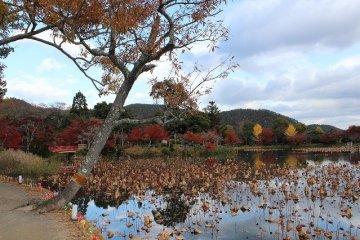It is said there are three kinds of autumn leaves. Leaves change in appearance during their first color change, the peak, and the withering process. From the same trees that created ''cherry blossom blizzards'' in spring, now fall rich yellows and deep reds around Osawa Pond. I took a walk to see this beautiful scene.
The history of Daikakuji (Daikaku Temple) traces back to Emperor Saga. During the Heian period, the emperor had the highest authority in politics. However, that emperor's own judgement determined his success and length of his reign. Chief advisors could easily gain influential power. This is the setting from which the tale of Daikakuji's protagonist, Princess Seishinai Shin'noh, appears. She is Emperor Saga's daughter.
To Imperial Princess Seishinai Shin'noh, who got married to her uncle, the retired Emperor Junna, it was only natural that she wished her son, Prince Tsunesada, to become an heir.
However, ''Our grandson Imperial Prince Michiyasu should become the next Emperor. Someone such as Tsunesada won't do. Michiyasushi is in direct imperial line of royalty with Emperor Saga.'' Emperor Saga’s other daughter and wife of Fujiwara no Yoshifusa, Minamoto no Kiyohime, insisted.
Yoshifusa visited the imperial court to speak with his younger sister Junko face-to-face. The fallen petals of late winter camellia flowers with their deep hues of red in the garden were not noticeable to Yoshifusa. His gaze was drifting in the air. He must just have been imagining the Fujiwaras’ prosperous future.
On the contrary, history was about to take a different course.
In 840 Emperor Junna died, then in 842 Emperor Saga became seriously ill. Already by this point the regime had transferred imperial rule to Yoshifusa's younger brother, Emperor Ninmyo.
During this time, Tomo no Kowamine and Tachibana no Hayanari were both serving under Prince Tsunesada. They worried the now higher ranking prince would be a target for assassination, so they orchestrated attempts to move him to the east of the country.
''Please lend us your power by any means'' they said to those they consulted, but they were left waiting for an answer for too long. One person consulted with was Prince Abo (nephew of Emperor Saga).
He replied ''I am sorry that such a heavy burden has fallen upon you,'' then proceeded to confide the whole story to Tachibana no Kachiko (the chief consort of Emperor Saga and the daughter of Tachibana no Kiyotomo).
At the time it was thought no woman such as Kachiko was able to devise such a cunning political scheme.
This was the work of a unique and eloquent woman of the aristocracy. In due course, she would speak with Yoshifusa without mentioning any bad news. Yoshifusa appealed to Emperor Ninmyo immediately. In reality, just as Yoshifusa planned, the regulation pushed through by Tomo no Kowamine to exile Tachibana no Hayanari was successful. Tachibana no Hayanari was assassinated en route to his exile.
This episode of fighting over succession to the imperial throne is called the Jowa Incident. Tsunesada becoming crown prince changed many plans. As a result, Yoshifusa, acting as the chief advisor, rose to power. Soon after, the ''flower of the Heian period'' as he was called, Fujiwara no Michinaga, became known as the one to solidify Fujiwara rule over the government.
At the moment of my visit, Osawa Pond at Daikakuji still retains a faintness of lotus flowers. Sitting on the veranda of the temple, you imagine imperial princess Masako alternatively gazing at the quarter moon in the night sky and its reflection on the pond.
When Princess Seishinai Shin'noh's father passed away, she changed the Emperor's villa into a temple. Chief priest and founder, Tsunesada, was said to have lived a quiet life for the rest of his days. Still, from then on the stagnant water of Osawa Pond was said to be a mirror of Princess Seishinai Shin'noh 's numb heart.


